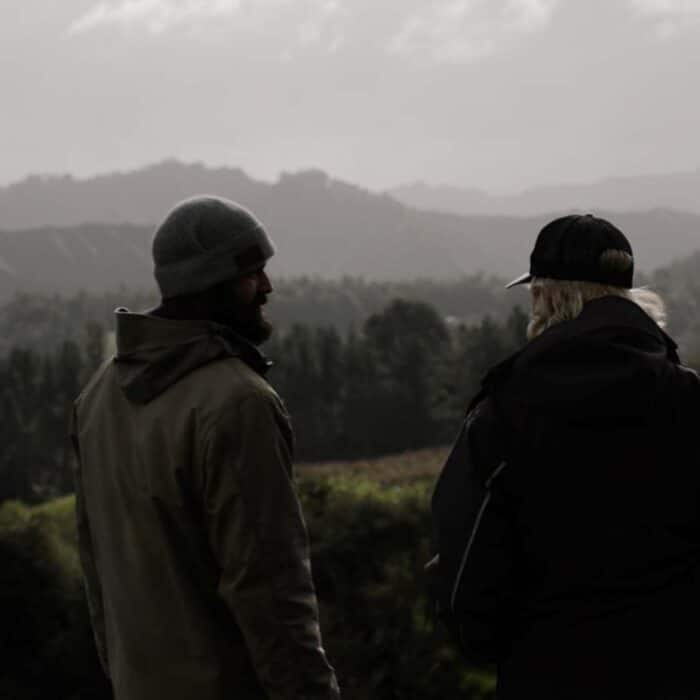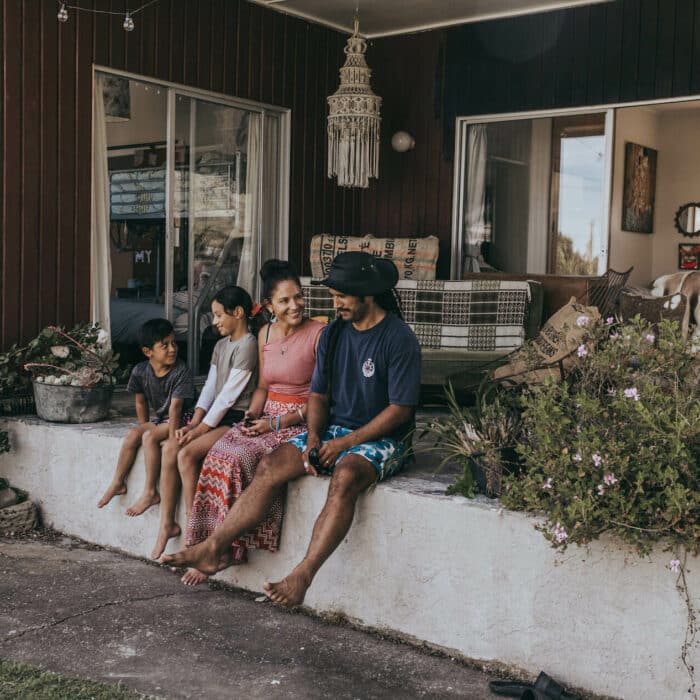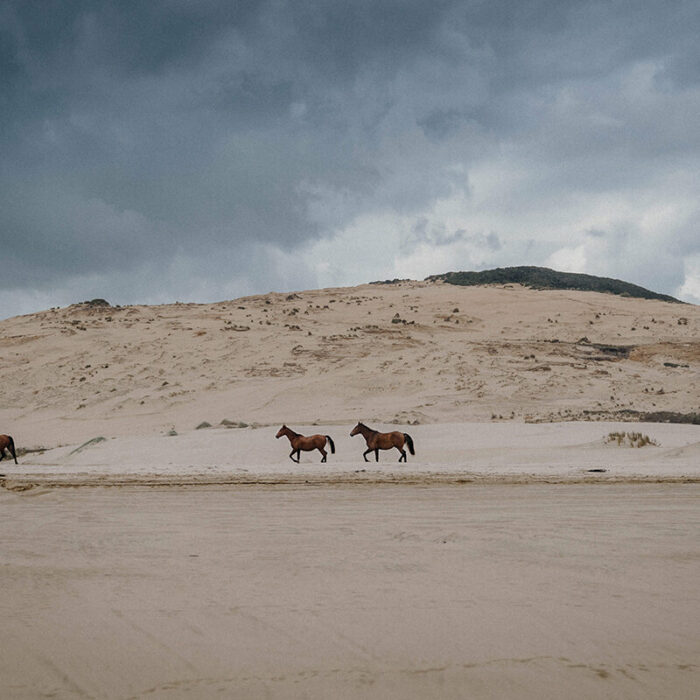04 September 2022
Lambing, dances every weekend, and cricket infestations – two old pals discuss a lifetime living in Auckland’s rural outskirts
writer: JESSICA DERMODY
photographer: ABBE HOARE
Friends – and relatives through marriage – Christine Pikett, 83, and Jenny Holst, 82, have both lived on the rural northern outskirts of Auckland their entire lives. They talked to Jessica Dermody about their early lives in the area and the changes they’ve seen in their community due to the not-so-slow spread of Auckland City.

The first of the season's brave daffodils sit boastfully in the middle of Christine's wooden table. Her house, built proudly atop the steep hills of her Makarau property, is filled with the warmth of freshly brewed coffee. Butter slides off fresh orange and cranberry muffins. Jenny has travelled around the harbour from her farm in South Head. She's brought more flowers, to celebrate the recent birth of Christine's great grandchild. Both women move around the kitchen with ease - Christine grabs the mugs, Jenny the milk. The familiarity with each other's presence is evident as they catch up on what's happened since they last saw each other.


The pair, who are family through marriage (Christine's youngest daughter is married to Jenny's youngest son), met sixty-odd years ago, probably at one of the many dances held in the area. Hosted by a range of organisations - from the Young Farmers to the basketball club - a dance was on the agenda almost every weekend. "You'd find out at the dance where next Saturday's dance would be. The boys paid, and the girls had to take a plate," says Jenny. The dances, held at local halls like Albany, Silverdale and Kumeū, were a common fundraiser for the various groups, and the main way of socialising for rural folk. It's easy to imagine the stories, if the hall walls could talk, and Jenny and Christine have a few belters of their own. "There was a dinner and dance at the South Head Hall, and I invited a young English couple who were new to the area," says Jenny. "I told them: 'Ladies, a plate.' Well, they arrived with a knife, fork and an empty plate each!" she laughs. "Oh, they aren't the first and they won't be the last," Christine chimes.


Both women have a deep connection to the north Auckland area, which sits on the outskirts of Helensville. It's a region that's slowly being eaten up by the ever-expanding city. Jenny and Christine have witnessed the changing of the landscape first-hand. What used to be predominantly working land is now mostly housing communities and lifestyle and smaller farming blocks.
Christine's family are originally from up the road in Tahekeroa, "a place no one has heard of," she laughs. She met her husband, Neil, at the Young Farmers Club, and the pair purchased 350 acres of "hard country" in Makarau. It wasn't a glamorous start to life on the farm for the couple - Christine reflects on the times of hardship as if it were just yesterday. "We ran into drought early in our marriage. Then came a massive infestation of crickets," she grimaces. The infestation got so bad in the area that planes were dropping bait pellets on the land. "The crickets were piled up yay high along your house," she says, as she motions to the large glass doors in front of her. Christine oversaw the farm. "Neil got asked to do three days of driving trucks. That turned into fifteen years," she smiles. "I did the lambing beat, he drove trucks. We had to, so that we could afford to keep farming. Although my parents weren't happy," she laughs. "They used to say, 'what's the matter with this man if he can't work on the farm?'."
"It was the same for us," adds Jenny, who grew up just out of Helensville. "It was only me and my sister, so no son for our father to pass the farm on to. My husband wasn't a farmer; he became a stock agent after we married," she says. As it does for many rural New Zealanders, living remotely on a farm meant special trips to 'town' for Jenny. As a child, these trips took the form of extended stays at the home of her aunt who lived in Meadowbank in Auckland, so that she could roller-skate at the rink there. Much to young Jenny's excitement, a rink was later built in Helensville. "That's where you met your husband, isn't it?" chirps Christine. Jenny laughs, "There was only ever one guy who was any good; he had a busy time! But Trevor [Jenny's husband] never tried to get on the skates, he just watched over the wall and thought, 'Oh, she doesn't look too bad!'." The pair laugh, the memories of skating and dancing evidently still clear in their minds.


Following the passing of Jenny's father, she and her husband leased the farm off a trust until it was eventually sold. They purchased their South Head property soon after. "The farm wasn't big enough to continue making a profit. We turned to the wool business - that kept us alive. A lot of the time, that was our only income," says Jenny. The wool boom of the fifties is a period both women remember fondly. They both remember stories of children pacing around farms, collecting wool off fences and dead sheep in order to make the most of its worth. Christine fondly recounts one day as a child, her father coming home and throwing his hat in the air and yelling "The farm is ours now!" He'd just paid off the last of their mortgage with a wool cheque. "Imagine doing that now," Christine shakes her head.
Both Christine and Jenny gracefully acknowledge they were relatively young when they married and had children. But neither regret it - it means they've spent invaluable time with grandchildren and great-grandchildren while they're still able to keep up with them. They share an appreciation for how different women's lives are now, in comparison to when they were young. "Opportunities to work, off the farm, just weren't there for us," says Christine. Jenny adds, "I see lots of women now moving from the city to the country and starting their own businesses. I just think my gosh, they do so well!"
Both women's farms are significantly smaller these days, with corners and squares sold to keep up with the ever-growing demand for lifestyle blocks. However, Christine and Jenny each have a modest number of sheep they still tend to. Despite Christine's beloved husband passing a number of years ago, she still lives in the beautiful and spacious farmhouse they started building together before he died, with their daughter and her family as neighbours just down the road. Dark wooden sleeper beams line the roof - her husband had a habit of collecting wood, she says. "That timber could've been salvaged from the Kumeū saleyards after they were pulled down." The sitting room overlooks rolling hills dotted with her fifty-odd sheep. With those centrepiece daffodils hinting at the coming spring, Christine chuckles at the thought of doing a lambing beat now. "The ram has gone AWOL - must have had enough of the women!" she laughs.



Christine and Jenny are quick to agree they would never live anywhere else. "I couldn't be anywhere without having my hands in the soil," says Jenny. Her eyes twinkle as she describes the view from her living room, which overlooks the Kaipara Harbour. "Some mornings I wake up early and sit in the kitchen with a cup of tea and think 'Gosh, how lucky are we?'" Christine agrees. "When the mist rises from the river among the hills and the sun comes over the pine trees, it glows; it's like a painting. And that's only from my bathroom," she says.
As more and more people leave the city to invest in their own slice of these views, the community dynamic in the towns on the outskirts of Auckland continues to change. Often both parents in a family are working, and people tend to travel to the city for work rather than working locally. Children are enrolled in Auckland's larger schools, which are seen to provide more opportunities. Jenny describes early mornings where she lies in bed listening to cars leaving at 5:30am - and not returning until 6pm or later. "It sometimes makes me wonder about the lovely piece of land they're living on and if they get to enjoy it," she says. Her closest neighbours are currently selling their property. "They had people looking at it the other day and one of the first things they asked was, 'Can you get Uber Eats to deliver here?'" Jenny explodes with laughter. "You are joking! I've heard it all now," Christine joins in.
Jenny and Christine, who've dedicated countless hours to helping local groups like the primary school and the hall, share a worry for the future of this important community work. "It's beginning to be left to the older generations," Jenny says.
While a move to the city isn't on the cards, Jenny does acknowledge the silver linings of urban dwellings creeping closer to their farming fortress. "Our area has a lovely walking group and it's a great way to meet new people coming into the district. They're so interesting; such different lifestyles. That wasn't there when we were all just farmers."
But of course, neither women were 'just farmers'. Both raised families, got numerous children to the school bus on time, cooked, did the lambing beat, cleaned, paid the accounts, shifted the sheep and volunteered their spare time for various boards, community projects and groups like Rural Women - and they still do. "It's just what you do," they agree with a shared smile.


This story is part of THREAD, a year-long project by Shepherdess made possible thanks to the Public Interest Journalism Fund through NZ On Air.
If you enjoyed this story, please share with someone else.
Get your hands on a copy of Shepherdess.
Related Stories
Ahipara
Like a lot of coastal towns in Aotearoa New Zealand, Ahipara is remote, but its community is vibrant and strong.
By River and Road
Natalie, 33, never intended to stay in Whanganui when she first moved to the area five years ago.



